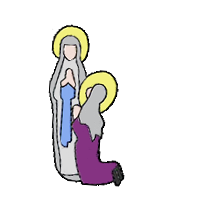GEOGRAPHY
"The study of geography is about more than just memorising places on a map. It's about understanding the complexity of our world, appreciating the diversity of cultures that exist across continents." Barack Obama
At St Bernadette’s, our pupils know what it is to BE a geographer. They are encouraged to be curious, be excited about the world in which we live, ask questions, care deeply about the environment around them and to explore the natural world. Our geography curriculum exposes our pupils to the empowering nature of geography: to understand the impact of the human footprint on the world and to know that, as both an individual and as a community, they can affect change.
As with all our subjects, our subject design interrelates different strands of knowledge:
Substantive knowledge represents the geographical content that is taught in each year group. In planning, this knowledge is the content we want pupils to know and remember including subject specific vocabulary.
Themes are the key ideas involved in framing the unique contribution of geography as a subject discipline. They underlie a geographical way of investigating and understanding the world. They are explored and built upon in each year group which allows us to make connections so that children can easily activate prior knowledge and begin to develop familiarity and confidence, which then supports their future learning within the subject. In geography, our themes include:
- Space: Understanding location – a specific geographical point on the earth’s surface
- Place: Understanding the physical and human characteristics of a location and the meaning humans attach to it
- Cultural understanding and diversity: Appreciating the differences and similarities between people, places, environments and cultures
- Interdependence: Understanding the social, economic, environmental or political connections between places
- Sustainability: Exploring sustainable development and its impact on environmental interaction
- Scale: Appreciating different scales (personal, local to national, international and global)
- Change: Understanding how sequences of events and activities in the physical and human worlds lead to change in places, landscapes and societies
Disciplinary knowledge represents the skills of a geographer. This knowledge is drawn from the National Curriculum programmes of study and is organised into a vertically integrated progression document so that we can ensure progression and provide opportunities for pupils to build, revisit and deepen their knowledge and skills.
Assessment in Geography is more than just knowing facts, names or places. We assess the pupils’ ability to apply their knowledge through our clearly defined outcomes at the end of each unit of learning. This provides information on the children’s ability to use a combination of substantive, disciplinary and procedural knowledge.
